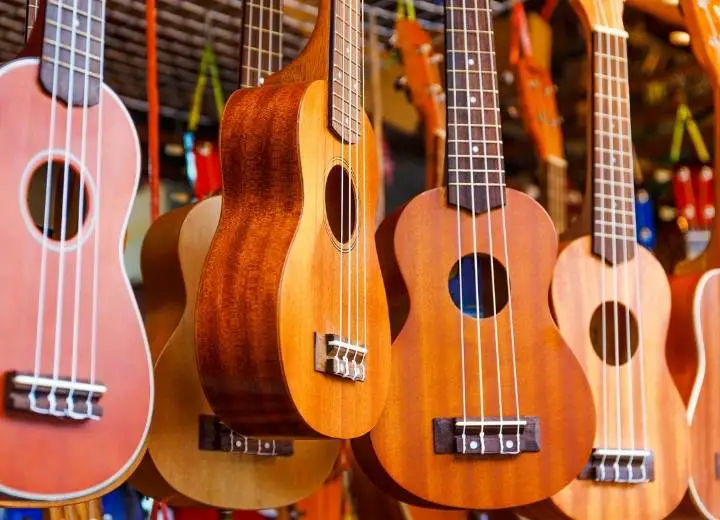
In terms of material used, there are plastic ukuleles and wood ukuleles. Each type has its advantages and disadvantages. If you are not sure which one to choose between them, keep reading.
In this article, you will find the difference between the plastic and wood ukulele. Then you’ll know which one suits you more.
Differences between a plastic ukulele and a wood ukulele
#1. Material
The material used is the most obvious difference between a plastic ukulele and a wood ukulele.
Manufacturers use plastic like ABS composite to make plastic ukuleles. For wood ukuleles, the common wood used in producing is mahogany, ebony, pinabete, etc.
#2. Produced sounds
The porosity of wood is the main factor determining the resonance of a wood ukulele. There are many tiny holes in the wood. Due to these holes, sounds and vibrations will bounce constantly inside the ukulele. This gives the produced sounds of a wood ukulele a peculiar brightness.
On the opposite, plastic doesn’t have porosity. So, the sounds made from a plastic ukulele are less bright than a wood ukulele.
Moreover, a plastic ukulele has a plastic bridge attached to the resonance cap. Thus, you can’t modify the bridge to adjust the pitch.
#3. Appearance
For a wood ukulele, people usually keep the natural color of the wood and cover it with a glossy coat. This makes wood ukuleles look classical. There are also painted wood ukuleles, but not very popular.
Different from wood ukulele, the colors of a plastic ukulele are very diverse. The material is ABS composite, so plastic ukuleles usually have transparency. If you like flashy style, colorful plastic ukuleles will be great.
Advantages and disadvantages of a plastic ukulele
#1. Advantages
- Made of ABS, a super-resistant plastic, a plastic ukulele can follow you anywhere. Weather and temperature can’t affect the sound of a plastic ukulele. So, you can take this ukulele with you whether it’s hot or cold.
- A plastic ukulele doesn’t need as much care as a wood one. If it gets any dust or dirt, you can easy to clean it with a damp cloth.
- A wood ukulele will swell and may get damaged when getting wet. But a plastic ukulele allows you to submerge it in water. It is water-proof, so you can rest assured to take it to the beach or pool to play.
- Plastic ukuleles are often transparent and have many different colors. Therefore, with their original appearance, they may become a unique accessory.
- In terms of price, a plastic ukulele is much cheaper than a wood ukulele. So, it is an affordable choice for many people.

#2. Disadvantages
- Vibrations and resonances of the plastic are not as good as those of the wood. So, sounds produced by a plastic ukulele will never get the high brightness as the wood ukulele.
- It is hard to identify the frets on the fretboard of a plastic ukulele. The plastic also blends the dots indicating the fret numbers. Thus, if you are a beginner, a plastic ukulele will make your learning process harder.
Advantages and disadvantages of a wood ukulele
#1 . Advantages
- Wood ukuleles make brighter and better sounds than plastic ukuleles. Wood has a porosity making sounds and vibrations more resonant, but plastic doesn’t.
- The tone of a wood ukulele will be better over time. That means the longer you use a wood ukulele, the better sounds you’ll make.
- Some people like showing off their wealth. Bringing a high-quality ukulele can help them do it.

#2. Disadvantages
- A wood ukulele needs more care than a plastic one. You have to ensure the proper humidity and temperature when storing a wood ukulele.
- The price of a wood ukulele is much higher than a plastic ukulele
Conclusion
We have provided you all the information about plastic ukuleles and wood ukuleles. You should consider carefully the strong points as well as the drawback of each type.
Choosing a ukulele will take your time and money. We hope that you can pick a suitable one.
